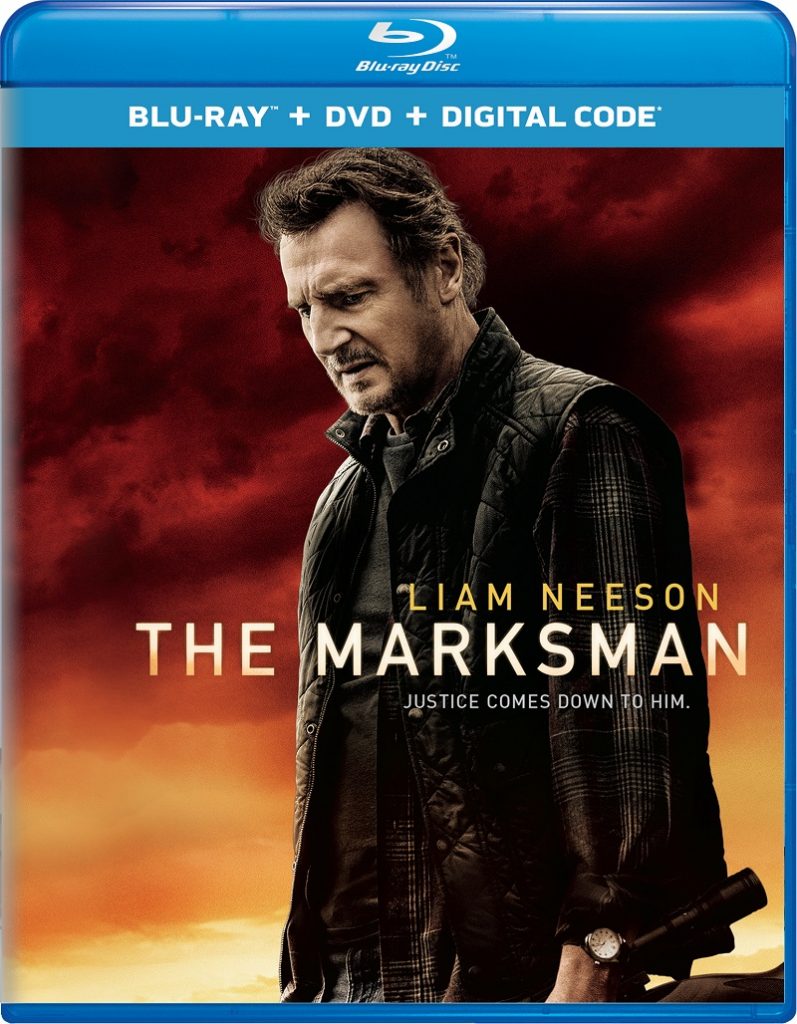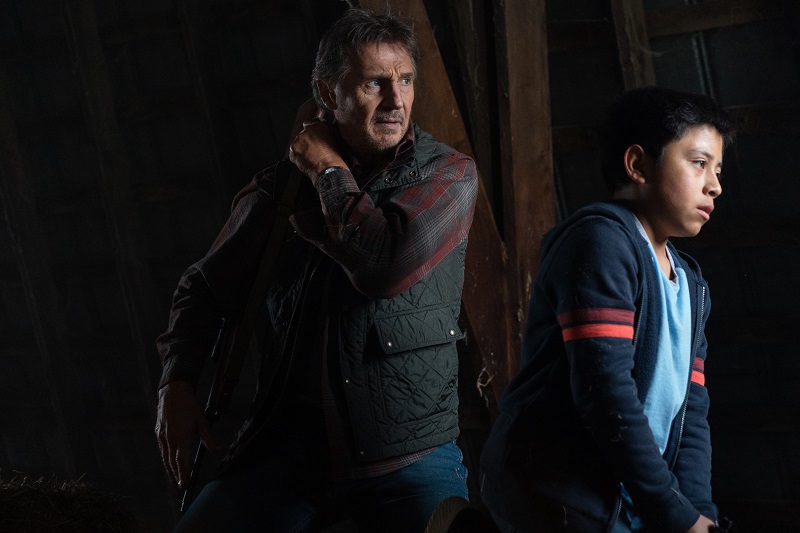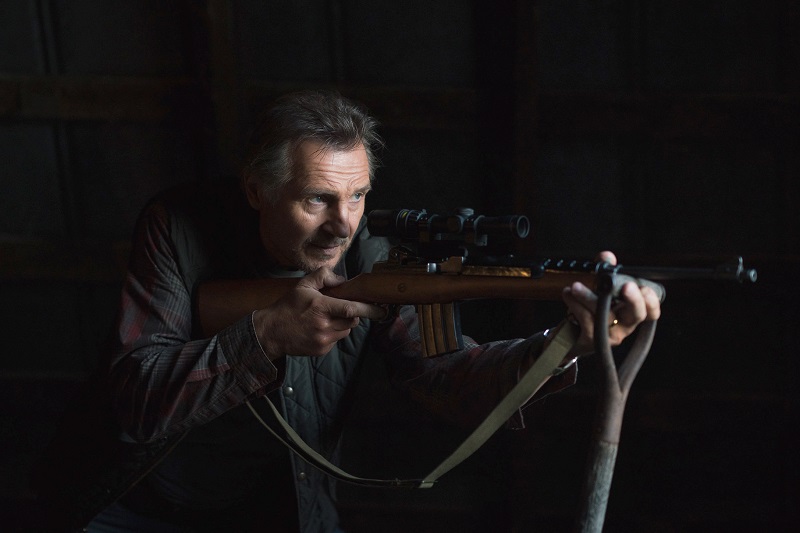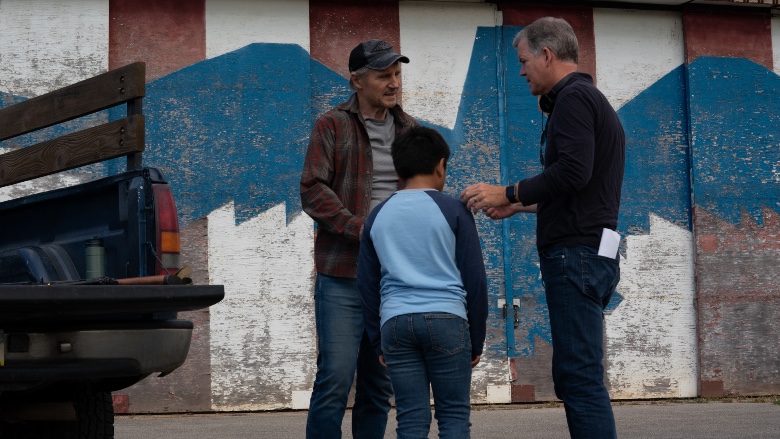Liam Neeson wielding a weapon (or his fists), fighting for justice, or righting a wrong, has found the Irish actor adding another element to his esteemed acting resume since he exhibited his very particular set of skills back in 2008 with Taken. Since then, he’s made a slew of action flicks that work with his real-life set of skills—some well (The Grey, Cold Pursuit) and some not-so-well (The Commuter, Taken 2… ironically!).
Now, Neeson is back with The Marksman—out on DVD, Blu-ray, and all digital formats. The Robert Lorenz directed film finds him portraying Jim, a Marine veteran whose gifts as the titular arena are established firmly in the film’s opening moments as he protects his cattle from predators. He lives in Arizona, right on the border with Mexico. What else is immediately clear is so-called “illegals” routinely walk across his property on their quest for freedom and a better life. It occurs so often that Jim has been given a wireless radio by the U.S. Border Patrol to call it in.
He’s having trouble paying his mortgage, all while still mourning the loss of his beloved wife—who perished a year prior after a horrendous battle with cancer. Jim is not desperate, per se, but he’s not that far away.
We also learn early that the cartel has been violently using this particular U.S.-Mexico border area to run everything but the kitchen sink. This group forced Rosa (Teresa Ruiz) to grab her son Miguel (Jacob Perez) and get out of the country ASAP. Seems Miguel’s uncle gave the cartel thousands upon thousands of reasons to take him out, with the promise that every member of his family would be next, especially since the evil doers believe Rosa has the very thing her brother stole.
Lucky for Rosa and Miguel, as they cross the border on this particular day, Jim is driving by just as the cartel’s thugs are pulling up on their side of the geographical divide. Shots are fired, a child is orphaned with Rosa’s last words directed at Jim. Her dying wish? Having The Marksman promise to save her son and take him to the only family he has left—who lives in Chicago.
The cartel is coming, and now we can add Jim’s name to Miguel’s as targets for their wrath.
That’s a powerful and intriguing premise. Too often, something gets lost between a story’s idea phase and its execution. For the most part, The Marksman works, not only as a great vehicle for Neeson but as a timely tale that is both wholeheartedly entertaining and yes, endearing. Although there are a few meandering moments, the film grabs you from the get-go and keeps that attention throughout.
There is an immediate connection established between the audience and Neeson’s Jim. Contributing to this is the presence of Sarah (Katheryn Winnick), his step-daughter, in the initial moments of the movie. Much is revealed in a short amount of time which possesses both an emotional punch as well as reveal details that add layers to our evolving and complex narrative, such as the fact that Sarah is a high-ranking Border Patrol agent.
The man who turned in border crossers now has left everything he knows and owns behind and has taken a boy who wants nothing more than to “go home” and hit the road with the most nefariously violent of monsters with bloodlust in their eyes who are hot on their trail.
Credit for this film’s impact can be shared by many, but it has to start with the script penned by a trio of writers—Chris Charles, Danny Kravitz, and Robert Lorenz. Their story is compelling and is genuinely surprising with how the creators have this ability to paint a canvas that appears on the outside to be something audiences have seen countless times. In fact, while witnessing the thrill ride, The Marksman feels fresh. At the core of this is the relationship and connection between Neeson and Perez. The entire thing doesn’t work if these two actors don’t jive.
They do, but it is completely organic how their relationship progresses. It is an utter joy to witness as it unfolds. Each keenly knows the stakes, made even more present, and as Jim hears from Sarah that his family ranch has been burned to the ground. The cartel-driven retribution only hardens Jim’s resolve to do everything in his well-trained power to ensure this child finds safety, and the love the child so desperately needs with family in the Windy City.
Neeson does it again. He crafts a character that we root for and, in this case, it is not simply enforcing the right against those who wrong. This is a man who is driven by a mostly conscious desire to find peace. His life has been terrible turmoil in the last few years, preceded by blissful beauty with his wife and small family with Sarah. Before that was devotion to flag and country. Through all those ingredients into one stew that is his current landscape, and one finds a man sorely needing simple solace in a sea of violence and death.
The actor takes what was on the written page and with his vast talent and experience has come to embody a soul in the most visceral yet ingratiating of ways. He is a man of principle who feels as if he has been on the losing end of the life stick too much of late. To witness him evolve into a vessel for justice in the most unlikely of scenarios for his own personal history DNA, is impressive. His performance is proof that if Neeson gets a script riddled with emotive tethering between what is occurring on-screen and those watching in the audience, he can portray that aging action hero once more without feeling as if he is repeating himself.
Perez makes an impressive talent announcement with his big-screen debut. The young thespian embodies so many who arrive on our side of the fence with a persona that is stressed, emotionally burnt, and overcome with a bewildering sense of purpose. Miguel makes it hard on Jim at first, to the point where we even wonder why the veteran is risking everything to drive thousands of miles from home. But then, we, and clearly Jim, douse that burning doubt with consideration over what Miguel has gone and is going through. After all, he is just a kid. That fact is only made possible by the gifts of the real-life kid behind the onscreen child.
It will be great to see where Lorenz goes from here. His experience shadowing a great as a first or second unit director has added up to something special. Lorenz’s first film may have been a bit off and uneven, but you cannot say that about his second, The Marksman. The filmmaker served under Clint Eastwood for American Sniper, Million Dollar Baby, Mystic River—and many more dating back to The Bridges of Madison County in 1995.
The helmer (who made his directorial debut with the Eastwood starring Trouble with the Curve) has a solid finger on the pulse of his movie. The pacing, except for a few spots, is always forward-moving, even when our subjects are standing still. For example, a seemingly simple dinner is shot with an immediacy that allows for introspection as well as exposition, all while keeping the tenor of the thrills palpably close. There may be a moment or two that are predictable, but for the most part, The Marksman carves its own place at the action movie table featuring a titular character we admire and an overall arc that expresses a modern-day definition of justice.
Sadly, when it comes to bonus features, there is but one. The Making of The Marksman offers some terrific insight into the nitty-gritty of the production, but the biggest takeaway from the sole featurette on The Marksman is the collective endearment shared for its star by folks on both sides of the camera. For the man who first caught our eye in 1981’s Excalibur, after four decades in the business and an enormous amount of success earned in the latter half of that career… let’s just say he doesn’t have to be all things to all people.
Yet the sentiment one walks away with after taking in The Making of The Marksman is that he is a generous artist who is there for his castmates in ways that elevated their performances. Also, as a filmmaker, Lorenz makes it clear that there couldn’t be anymore more simultaneously creatively collaborative and willing to take direction. That last part isn’t necessarily a given on film sets.
When it comes to those questions, such as “how did they do that?” and the like that many making-of featurettes address, the one included on Lorenz’s flick won’t be answering those inquiries. This is much more general as a whole, in terms of scope. It provides more information on the overall process of bringing The Marksman to the screen than how it specifically was achieved. That’s fine. It doesn’t try to be something it’s not.
Plus, sometimes the magic of the movies is best left as just that—magic. No need to peek behind the curtain every time. The Marksman stands on its own as a film experience and The Making of featurette is like the cherry on top of a tasty treat.
Film Grade: B
Bonus Features: B





